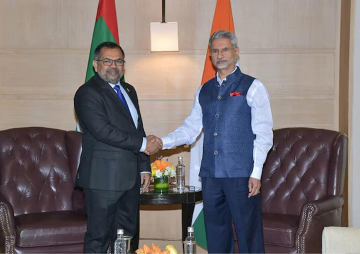Observer Research Foundation in collaboration with the Delhi University conducted the third summer workshop for undergraduate students of Delhi University from 17 May to 2 June. The theme of this year's workshop was "Contemporary Challenges and the Making of Public Policies".

Observer Research Foundation in collaboration with the Delhi University conducted the third summer workshop for undergraduate students of Delhi University from 17 May to 2 June. The theme of this year’s workshop was “Contemporary Challenges and the Making of Public Policies”. A total of 22 students, studying English, history, journalism, economics, political science, and commerce in different DU colleges such as Delhi College of Arts and Commerce, Gargi, Hansraj, JMC, Khalsa, LSR, Miranda House, Motilal, PGDAV, and Ramjas, took part in the workshop.
A similar workshop was conducted in 2008 and 2009 which generated a lot of enthusiasm among the students. The main purpose of organising such workshops during the university summer holidays is to generate awareness among students on various public policy issues and on the role of think-tanks in public policy making. It is expected that such an initiative will motivate the students to pursue careers in public policy research.
The workshop was inaugurated by the Vice Chancellor of the Delhi University, Prof. Deepak Pental. He told the participants that this was an excellent opportunity for them to interact with experts working on policy issues. He said while students have their own ideas and vision about the country, participating in this kind of events will help them achieve a level of maturity and improve their ability to think analytically. He stressed on the need for advocacy of ideas till they are implemented.
The keynote address was delivered by Mr. Manish Tewari, Member of Parliament and honorary advisor to ORF. He pointed out that the younger generation could play an important role in policy making. To this end, he stated that all those who are interested in making a difference to the national discourse must, in addition to their academic curriculum, prepare themselves in such a manner that their ideas are heard. He said some of the most imaginative and original ideas can emerge from the younger generation who have the ability to see the body of knowledge as it stands today and then critically appraise it to arrive at a perspective which may be refreshing and different and can make all the difference as to how public policy evolves.
Mr. Sunjoy Joshi, Distinguished Fellow, ORF, chaired the inaugural session. He said the workshop will help the students in gaining knowledge on numerous ideas, concepts and disciplines and will build their capabilities.
During the two weeks of the workshop, a total of 22 lectures were delivered by the ORF faculty who covered numerous public policy issues. The titles of some lectures were international cooperation on current global issues, India’s options for energy security and climate change, intellectual property rights, and how science and technology changed the way we live.
The workshop schedule included two lectures daily in the forenoon. In the afternoons on each day, students worked in groups to prepare their project reports. Four groups were formed and each group was guided by a mentor in the completion of a concise project on a specific public policy issue. On the concluding day of the workshop, i.e., 2 June 2010, students got the opportunity to present their work. The project assignments and presentations were evaluated by jurors from DU and ORF, and the groups were suitably rewarded during the valedictory session of the workshop. The students were also given a certificate of participation.
Information on the title of project reports prepared by the four groups, names of students in each group, and their performance is given below:
• Right to Information: A People’s Process (Aditya Ramesh, Ankit Arvind, Manas Srivastava, Meenal Dharia, Nazneen Begum, Sheetal Digari won the first prize).
• Private Participation in the Defense Sector (Ankur Deka, Avinash Kumar, Shalini Tyagi, Tania Goklany, Vinita Negi won the second prize).
• Indo-Russian Role in Afghanistan (Geetika Sharma, Mansi Saxena, Nilesh Kumar, Rohan Gupta, Sanjana Manaktala won the third prize).
• Rural-Urban Migration: Problems and Prospects (Ankita Dhanda, Malvika Tripathi, Megha Nath, Niharika Singhal, Nitish Sehgal, Sonu Kumar Ranjan won the third prize).
The valedictory session of the workshop was chaired by Mr. M. Rasgotra, President, ORF Centre for International Affairs and a former Foreign Secretary. The chief guest was Mr. Abid Hussain, a former Secretary, Government of India, Indian Ambassador to the US and Trustee, ORF. He said the knowledge gained through the workshop will add to the information which they have already gained, and that this gives them the chance of examining some ideas which were not critically examined before.
Mr. Hussain described two important developments that have changed the context in which the national challenges have to be seen – burst of technology, and globalization. On policy making, he said the greatest challenge is to evolve policies that meet the interests of the country, and emphasized that the entire process of evolving policies should be linked with other countries.
Giving the example of climate change and global warming, Mr. Hussain said that while it is important for India to control carbon dioxide emissions, such issues are linked with the practices followed in other countries, and it is only through joint efforts that such problems can be tackled. Another example of energy was discussed for the benefit of students. In this respect it was mentioned that while India must build up its own strength of energy domestically, the realm of energy has increased phenomenally in recent times with the focus moving from coal and water to nuclear energy.
On security, he said that stability within the State is extremely important, and unless it is ensured that property and personal matters are safe, the country is not safe at all. He said that any discussion on the security of the State cannot remain confined within the geographical boundaries of the country, or to the State actors within or outside the country, but it is extremely important to analyse the role of non-State actors also. Thus for security, one needs to take a very different view from what was being taken earlier.
The purpose of giving such examples was to explain to the students that today’s world requires policy makers to look at the problems in a much different manner than what was being done previously. To this end, it was stated that while domestic/national interest cannot be forgotten, the national interest has to match with the national interest of other countries, and for this reason, policies should have a foreign policy angle.
Mr. Abid Hussain outlined a three-pronged policy approach for meeting the present challenges, and reiterated that if sufficient attention is not given, the best results would not be achieved: (1) Need to strengthen the departments, professionals; create linkages with other departments, or with other professionals, or technicians (2) Need to create inter-linkages with governments of other countries (3) Need to create linkages with international, regional and local organizations.
The views expressed above belong to the author(s). ORF research and analyses now available on Telegram! Click here to access our curated content — blogs, longforms and interviews.




 PREV
PREV

